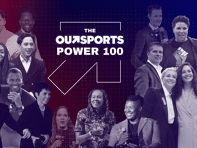Being Out is a feature that looks at LGBTQ people in sports who have come out since Outsports first published in 1999. Today: Runner Emma Gee.
Writing my coming out story was complicated.
I wasn’t sure how to explain the complex dynamic between my religion, sexuality and ongoing experience as an LGBTQ+ student athlete at Brigham Young University. I was afraid I couldn’t communicate the situation and my feelings effectively, and that the article wouldn’t make sense to strangers.
I was wrong.
Over and over and over again, I’ve felt understood by individuals who have reached out to voice their support. I’ve found myself in good company, connecting with thousands of people, straight and LGBTQ+, religious and secular, who want the world to be more inclusive.
Though I recently graduated from a university that continues to uphold homophobic policies, every email and direct message I receive is an important reminder that I am not alone in working to create environments that welcome, respect and embrace diversity.
A few months ago, I was on the brink of attempting to become an All-American in the 3,000-meter steeplechase. If I had accomplished my goal, it would have marked the first time an out LGBTQ+ athlete at BYU achieved All-American status. When the coronavirus crisis caused the cancelation of my final outdoor track season, I lost the opportunity to become the representation I sought so desperately during my time at BYU.
I still wanted to accomplish my goal, so I decided to enter the NCAA transfer portal.
As I researched the universities recruiting me, I came across one with the motto, “Perseverance Conquers.” The motto resonated with my resilience. Their website was also filled with commitments to protecting diversity and inclusion. It was an amazing opportunity. So, I committed to run for Temple University in Philadelphia.
At Temple, I will reap the rewards of my perseverance and, for the first time, be completely protected in my LGBTQ+ identity. Right now, I’m training for my final outdoor track season. I hope to qualify for the 2021 NCAA Outdoor Track and Field Championship and to qualify for the 2021 United States Olympic Trials in the 3000 meter Steeplechase.
Here are Gee’s answers to our Being Out questions:
What do you love the most about running?
What I love most about running is the people. My experience with Coach Diljeet Taylor and the women on the BYU cross country and track team was incredible. They are, without a doubt, the most competitive human beings I have ever encountered. Gritty and fierce, the only thing they love more than running is winning, and they consistently rank top in the nation.
My teammates trained with a ferocity that inspires their greatest performances. Watching them, I learned that success isn’t about talent or miracles or luck, it’s about intention, commitment, and heart. Coach Taylor empowers the team with a “run for her” mindset, one that reminds me of my why: I run for the little girl who fell in love with the sport. She fell in love with the challenge of progress, and dreamed of becoming the best in the country.
I will eternally be grateful for the opportunity I’ve had to train with and be trained by powerful women. They have wholeheartedly embraced who I am and pushed me to fulfill my dreams.
What does it personally mean to you to be LGBTQ+ in sports?
For me, being LGBTQ+ in sports is about loving who I am and loving the possibility of who I can work to become.
What advice would you give to LGBTQ+ kids in athletics or who want to participate in athletics, the kind of advice the younger you wish you had heard?
Ms. Frizzle from “The Magic School Bus” said it best: “Take chances, make mistakes, get messy!” Beyond that, build on what works, make adjustments to training that isn’t working, be patient, trust the process, and persist. Always persist.
Who is someone that inspires you?
I inspire myself. My commitment to showing up as myself and progressing, no matter the environment, inspires my future fortitude.

What are you passionate/excited about right now?
I am in the process of writing a book titled “The Constant Vigilance of a Bothered Queen.” It tells the story of how I became the first out LGBTQ+ athlete at Brigham Young University and what happened before and after.
Why write a book? After Outsports posted my coming out story, I received (and continue to receive) hundreds of follow-up questions about what my experience has been like at BYU. I appreciate the questions. After all, the experience of LGBTQ+ students at religious universities matter. People deserve to know what’s going on and how things can be better.
I know I’m preaching to the choir here at Outsports, but there are many individuals, especially in religious communities like mine, who genuinely don’t understand what the experience of an LGBTQ+ person is like. Though I do my best to explain, I always think, “The whole story would be a better answer.”
The whole story includes my upbringing as a member of the Church of Jesus Christ of Latter Day Saints, why I decided to run for BYU, how I came to terms with my sexuality, my experience living in BYU’s culture and the time I spent working to improve the state of diversity and inclusion at BYU before and after coming out.
“The Constant Vigilance of a Bothered Queen” brings humanity to the heart of what can be a very divisive topic: the intersection of religion, sexuality, and sports.
I hope to have the book published by 2021.
What is your most memorable sports moment?
It was the third cross-country race of my freshman year at Brigham Young University and I could not mess up this race; it was the competition that would qualify my team for nationals and allow me to keep my spot on the travel team.
I trained hard to make it on the travel team; a feat not often accomplished by an 18-year-old freshman. I ran 50 miles a week. I weight trained three times a week. I finished first in workouts. I watched what I ate. I sat in the ice bath. I grimaced my way through recovery massages. I tried to get nine hours of sleep with six loud roommates. I didn’t have a social life.
Sound like hell? It was. But so worth it to be the college athlete I always envisioned.
For about two months.
The confusing transition to college, the expectation, the isolation and the pressure caught up to me. I had no idea how to help myself. The things I did in high school weren’t enough anymore. My talent wasn’t enough. And I wasn’t good enough for people to want to help me.
The night before the second race where I messed up, I slept poorly. My nerves slept great. They had enough energy to become full-blown panic by the next morning. When I stepped on the line to start the race, I was exhausted. The gun went off and…
Timeout.
Ever since I started running in fourth grade, a recurring nightmare has haunted me. The gun goes bang. The race begins. I pump my arms, push one foot off the ground and run. I’m running and running and running but everyone goes by me and I realize I’m running in slow motion. No matter how hard I try, it’s like I’m running through honey.
I hate it when a nightmare becomes reality.
Anyway, the race sucked and I sucked and I was sucked into a vortex of regret, confusion, and self-pity. Meanwhile, my team qualified for nationals and I was done racing for the season. The reality of D1 athletics is that an athlete only gets a few chances to mess up before they get the plug pulled on competing. Failure isn’t allowed for long.
My team celebrated as we drove back to our hotel. I sat silently in the backseat, trying not to cry. I needed to find a place to be alone. Unfortunately, the race was in a small town in Wisconsin and it was 30 degrees outside. I walked to the only building within a mile of our hotel, a Starbucks.
I settled into a corner and called my mom. I started crying. She asked what was wrong.
What was wrong?
Everything would be an understatement.
“I did it again… I messed up. I don’t know if I can do this anymore. I work so hard and it’s all for nothing. I’m tired all the time and I’m not happy. I care so much and I’m breaking and no one here cares. I don’t know what to do and no one cares.”
Crying turned into deep, heartbroken sobbing. My fellow Starbucks customers looked up in annoyance. An emotional breakdown in Starbucks? Really?
My sobs echoed louder. It was stupid to sit in a corner.
One woman got up, bought some chocolate candies, and grabbed a napkin. She packed up her computer, walked over to my corner, placed the chocolate candies and napkin in my lap and walked out. I was still on the phone with my mom, so I didn’t get up. I just mumbled, “Thank you.”
It was another half hour before dehydration kicked in and I couldn’t cry anymore. My mom did her best to comfort me, validating my grief and trying to help me find a way forward.
The question of the day was: Should I, knowing the pain and sacrifice, continue running and pursue the dream made by a little girl? Or should I move on from sports and make new goals?
These were core questions of identity. In my life, I was first and foremost a runner. That is how I saw myself and how I assumed others saw me. And while I lost far more races than I won, the identity I developed in athletics made me stronger in every aspect of life. Was I ready to walk away?
This was an important question for me to answer.
I didn’t have an answer.
It was getting late and I didn’t want to walk back to my hotel in the dark, so I stood up to leave.
And just like that, an answer fell out of my lap.
I had forgotten about the chocolates and used the napkin to blow my nose. Both fell when I stood. As I picked the candy up, I noticed a small note attached to the back.
It said, “God loves you so, so, so much and he is so proud of you no matter what you decide.”
And I decided to keep running.
Emma Gee, 23, graduated from Brigham Young University with a degree in PR in April 2020. She is currently working on a Masters in Management at Temple University. The Broomfield, Colo., native served as chair of the diversity and inclusion committee for BYU’s Student Athlete Activities Committee and is now a member of the track team at Temple. She can be reached by email ([email protected]) or Instagram (emma_gee1777)
If you are out in sports in any capacity as openly LGBTQ and want to be featured in Being Out, drop Jim Buzinski an email ([email protected]).
If you’re an LGBTQ person in sports looking to connect with others in the community, head over to GO! Space to meet and interact with other LGBTQ athletes, or to Equality Coaching Alliance to find other coaches, administrators and other non-athletes in sports.



























